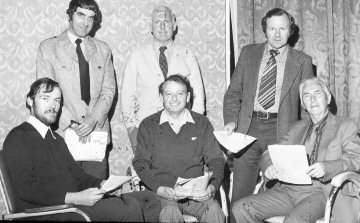A couple of years later when I was the ‘neutral’ judge in an Aer Lingus-sponsored school debating competition in County Down between two Catholic schools, I cast my deciding vote for St. Colman’s College of Newry.
Their teacher, Sean Hollywood, was of course delighted. (We had an unusual relationship – I had competed with him for a teaching job and was appointed. Only later did I discover that his religion had cost him the job. When we spoke about it later, he was understanding and supportive – but the whole of that story is for another time).
The Sister who was headmistress of the opposing team’s school was less than pleased by the competition result. ‘Of course, you are both from Newry, aren’t you?’ was her somewhat frosty comment What was significant to her was not religion but the fact that, as she saw it, we were two Newry men who were as thick as thieves.
Sean Hollywood the Legend
I was present during the mid-60s at an election meeting of the Northern Ireland Labour Party in the Boulevard Hotel, Newry. The candidate was the Belfast playwright Sam Thompson, and he made his famous ‘ten noddin’ ducks’ speech – a reference to the Ulster Unionists M.P’s servile relationship with the Tories at Westminster.
He was heckled throughout by Unionist and Nationalist activists, all of whom repeatedly cried ‘what about the border?’
l remember thinking at the time that it was such a shame that working class people could be so manipulated that they spurned the efforts of good men to bring about social justice, and how unfortunate it was that at grassroots level they could be divided in their education and even in their recreational pursuits.
For – make no mistake – just as the English preserved their class divisions through the exclusivity of admission to the playing fields of Eton, so too has sporting apartheid sundered the commonality of Irishness.
When I was young, my sister attended Irish dancing lessons with Catholic friends. One of my uncles, who joined the British Army to escape unemployment, became a great Irish dancer, and his singing party-piece was ‘Johnston’s Motor Car’. Thanks to the ‘Walton programme and Radio Eireann generally, I can hold my own with a guitar and a huge repertoire of Irish songs including virtually the whole Republican folk-song canon – to which customers in many a bar in Kerry, Galway, Sligo and Donegal could testify.
Will future generations of Protestants be embraced by Gaelic culture? It is not politicians who will decide that – but the leadership of Gaelic Ireland.
